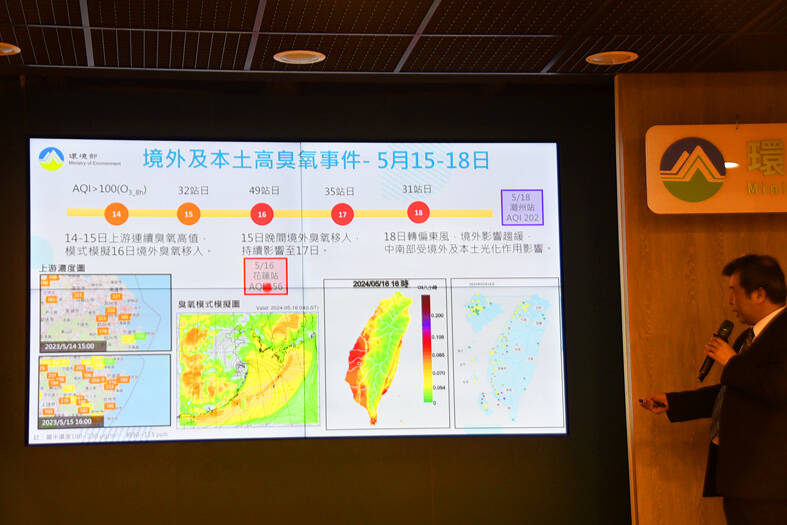The Ministry of Environment’s (MOENV) Air Quality Statistics issued on Thursday showed a general decrease in all pollutant density across the nation over the past five years.
Department of Monitoring and Information Deputy Secretary-General Hu Ming-hui (胡明輝) said statistics over the past five years showed that PM10, particulate matter 10 micrometers or less in diameter, have gone down by 8 percent, PM2.5 levels have fallen by 7 percent to 11 percent compared with last year, while nitrogen dioxide has gone down by 15 percent.
However, ozone pollution levels have only decreased by 3 percent, leaving much to be desired, Hu said.

Photo: Wu Po-hsuan, Taipei Times
Ninety percent of days in the five years had an Air Quality Index (AQI) level below 100, or were of average air quality, while weather stations only recorded 1,566 days during which the air quality was at “orange” — which is bad for those with allergies — down from 4,270 days in the five years to 2018, he said.
As of last month, the average PM2.5 density was 12.5mg per cubic meter, down from 13.7mg per cubic meter last year, the secretary-general added.
PM2.5 introduced from foreign sources in February coupled with this year’s Typhoon Usagi resulted in a spike in PM2.5 levels in Taiwan, Hu said.
The increased rain in the latter half of the year had helped reduce air pollution, Hu added.
Department of Atmospheric Environment Director-General Chang Shun-chin (張順欽) said NT$76.6 billion (US$2.34 billion) would be invested from this year to 2027 to decrease PM2.5 levels and ozone pollution.
The funds are to be used to target the petrochemical industry to reduce air pollution, lessen the number of high-emission vehicles by 50 percent, promote the use of electric-powered buses and environment-friendly joss paper, encourage ships to use coast-based power for recharging and restrict the residual amount of volatile organic compounds in commercial products, he said.
The new air quality standards, as defined under Paragraph 3, Article 5 of the Air Pollution Control Act (空氣污染防制法), that were amended in September are to enter into effect on Wednesday next week, Chang said.
The amendments would adjust the air pollution levels for the AQI, increasing the number of warnings issued, Chang added.
Air pollution forewarnings for outlying islands would be increased to three days of advanced warnings from one, allowing outlying islands to have more time to react to air pollution, he said.

Taiwan has received more than US$70 million in royalties as of the end of last year from developing the F-16V jet as countries worldwide purchase or upgrade to this popular model, government and military officials said on Saturday. Taiwan funded the development of the F-16V jet and ended up the sole investor as other countries withdrew from the program. Now the F-16V is increasingly popular and countries must pay Taiwan a percentage in royalties when they purchase new F-16V aircraft or upgrade older F-16 models. The next five years are expected to be the peak for these royalties, with Taiwan potentially earning

STAY IN YOUR LANE: As the US and Israel attack Iran, the ministry has warned China not to overstep by including Taiwanese citizens in its evacuation orders The Ministry of Foreign Affairs (MOFA) yesterday rebuked a statement by China’s embassy in Israel that it would evacuate Taiwanese holders of Chinese travel documents from Israel amid the latter’s escalating conflict with Iran. Tensions have risen across the Middle East in the wake of US and Israeli airstrikes on Iran beginning Saturday. China subsequently issued an evacuation notice for its citizens. In a news release, the Chinese embassy in Israel said holders of “Taiwan compatriot permits (台胞證)” issued to Taiwanese nationals by Chinese authorities for travel to China — could register for evacuation to Egypt. In Taipei, the ministry yesterday said Taiwan

POSITIVE DEVELOPMENT: Japan and the US are expected to hold in-depth discussions on Taiwan-related issues during the meeting next month, Japanese sources said The holding of a Japan-US leaders’ meeting ahead of US President Donald Trump’s visit to China is positive news for Taiwan, former Japan-Taiwan Exchange Association representative Hiroyasu Izumi said yesterday. After the Liberal Democratic Party’s landslide victory in Japan’s House of Representatives election, Japanese Prime Minister Sanae Takaichi is scheduled to visit the US next month, where she is to meet with Trump ahead of the US president’s planned visit to China from March 31 to April 2 for a meeting with Chinese President Xi Jinping (習近平). Japan and the US are expected to hold in-depth discussions on Taiwan-related issues during the

‘LIKE-MINDED PARTNER’: Tako van Popta said it would be inappropriate to delay signing the deal with Taiwan because of China, adding he would promote the issue Canadian senators have stressed Taiwan’s importance for international trade and expressed enthusiasm for ensuring the Taiwan-Canada trade cooperation framework agreement is implemented this year. Representative to Canada Harry Tseng (曾厚仁) in an interview with the Central News Agency (CNA) said he was increasingly uneasy about Ottawa’s delays in signing the agreement, especially as Ottawa has warmed toward Beijing. There are “no negotiations left. Not only [is it] initialed, we have three versions of the text ready: English, French and Mandarin,” Tseng said. “That tells you how close we are to the final signature.” Tseng said that he hoped Canadian Prime Minister Mark Carney